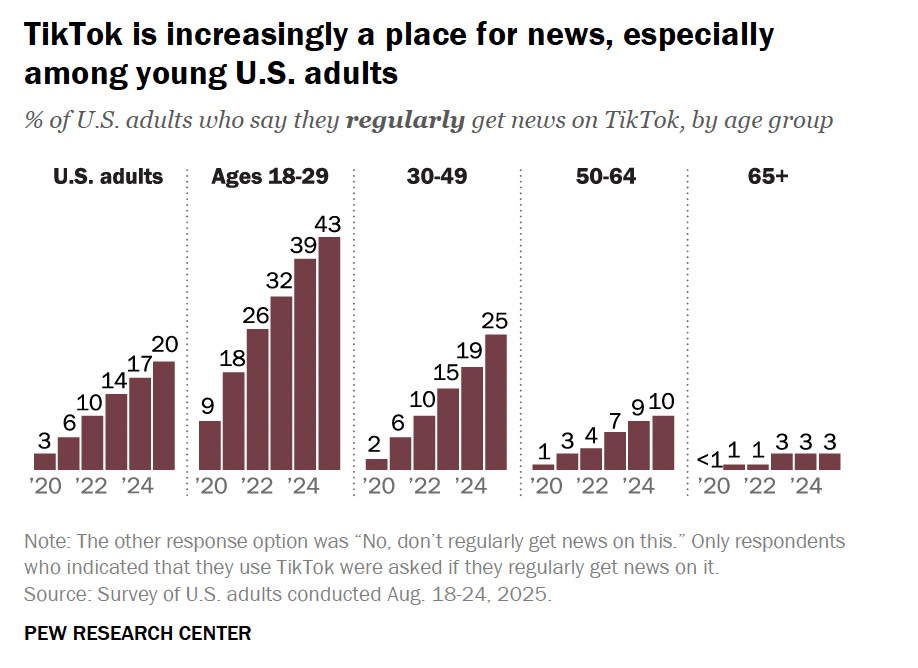Gen Z's newsfeed: dancing to diplomacy
The "g-word" in Democratic primary politics, MAGA's mad at Zach Bryan, a Gen Alpha beauty brand, and an AI actress.
Five years ago, TikTok was mostly for dance trends. Today, it’s Gen Z’s newsfeed.
The numbers: According to new data from Pew Research Center, young adults are almost five times more likely to get their news from TikTok today than they were five years ago.
Then, just 9% of 18–29-year-olds said they “regularly” got their news on the app.
Today, that number has soared to 43%.
Among all adults, the jump is just as dramatic — from 3% to 20% in the same period.
Youtube Still Rules, but TikTok Sets the Agenda
YouTube is still the primary social media platform for Gen Z teens — 90% of 13-17-year-olds say they use it — but TikTok has become their front page.
YouTube may still dominate by reach, but TikTok leads in influence and sets the agenda. It’s where cultural narratives are born, trends metastasize overnight, and political discourse gets reframed in 60-second soundbites.
For many young people, TikTok isn’t competing with traditional media, it is their media ecosystem. The line between “news” and “influence” has all but disappeared, and that’s exactly how Gen Z likes it. (And it’s not just any media ecosystem, it’s now teetering on the edge of becoming a political one. TikTok’s US operations are being handed over to a consortium of investors tied to President Donald Trump and allies like Larry Ellison and Rupert Murdoch; this shift raises the possibility that the algorithm, moderation decisions, and editorial priorities could tilt toward explicit political ends).
The Up and Up’s take: In 2020, two seismic shifts happened at once: a global pandemic and TikTok’s mainstream breakthrough. As young people were confined to their bedrooms, the app became an escape and a window to the world. What started as a home for The Hype House and renegade-style dance videos with Charli Di’Amelio or GRWM clips with Alix Earle quickly became Gen Z’s destination for news, politics, and even identity.
So what: In the past five years, two global wars have changed how young Americans think about international relations and geopolitics. First, the Russia Ukraine war, and after Hamas’ brutal attack on Israel two years ago today, Israel’s war with Hamas in Gaza. Immediately, young Americans watched global suffering unfold before their eyes in-real-time, in vertical video formats.
When we think about the trajectory of Gen Z’s politics, the impact of watching war live streamed on the very same platform they consume the rest of their lifestyle and entertainment content — and where they scroll from one video to the next in a nano-second — has played a massive role in exposing them to the horror of war and making them feel like experts on the topic, as if they are living it, too.
This has political ramifications. As Blue Rose Research told me last spring, they have observed a “very clear relationship between defection away from the Democratic Party and TikTok consumption.”
Legacy media’s catch up game: The changing media ecosystem was underscored again this week by blockbuster news that Paramount is acquiring The Free Press, a publication that built a massive audience through sharp, heterodox commentary that cuts against traditional coverage. In today’s fractured media environment, niche is the new mainstream. Gen Z news consumers want authenticity and personality. They trust creators who speak directly to them, often more than established institutions with bylines and mastheads. Legacy orgs don’t necessarily have to acquire entire digital outlets, but the savvy move here would be for traditional newsrooms to collaborate more with the very creators Gen Z already trusts on TikTok, or YouTube.
But the question becomes, what’s in it for the creators? The short answer is, everything. They hold the keys to the audience legacy media wants and they know it.
Other news
Noteworthy reads
Why Gen Z protesters worldwide are flying an anime pirate flag, Kate Bartlett for NPR
Gen Z is Getting Divorced, With the Help of AI, Annabael Iwegbue for Cosmopolitan
Gen Z Gets Its Own Class of Supermodels, Malique Morris and Brennan Kilbane for Business of Fashion


